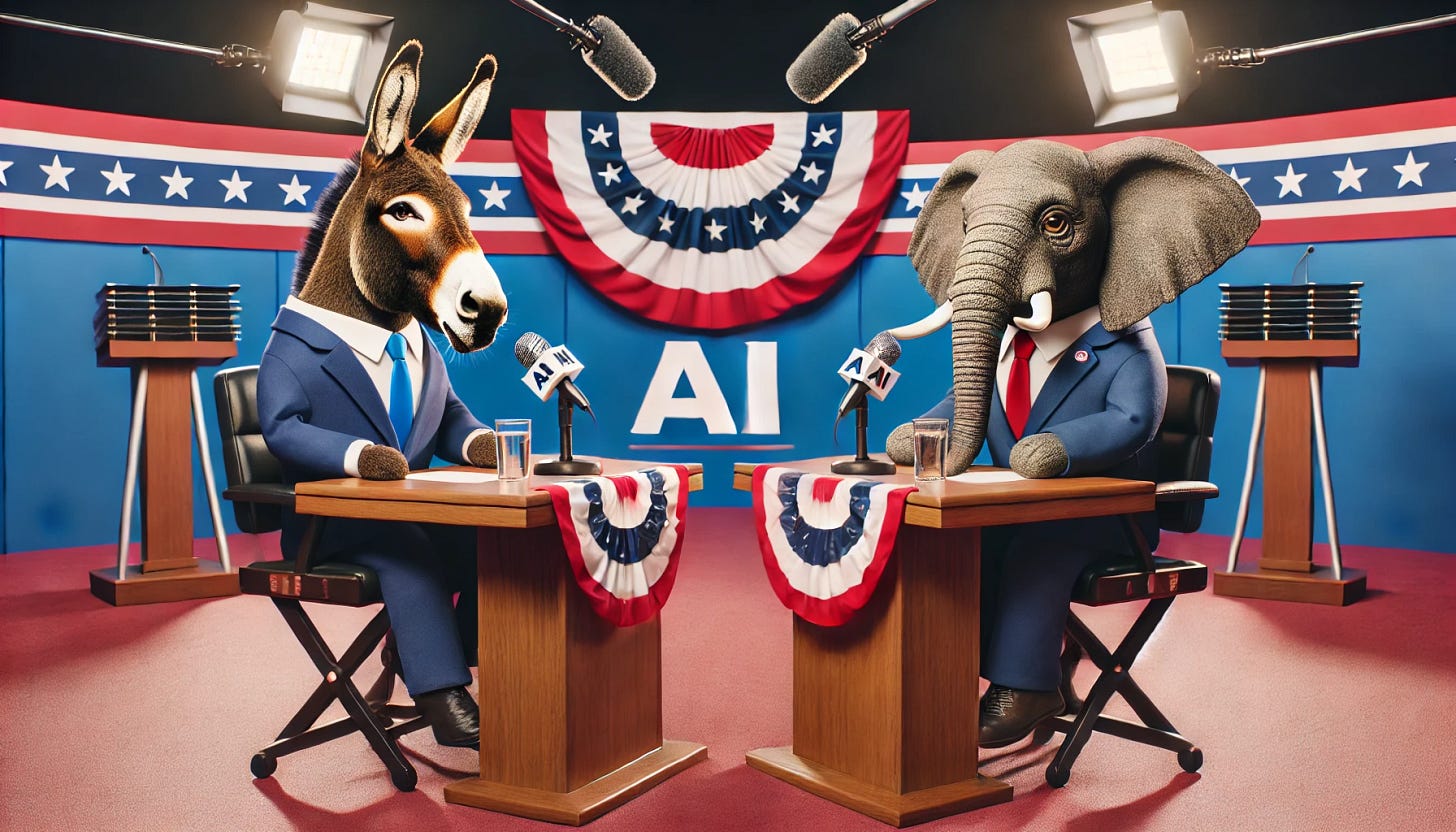As AI transforms our world, political parties and candidates should address the promises and challenges of this rapidly evolving technology.
It is hard to be a political optimist these days. So many issues are fighting against the tide of shorter and shorter attention spans. The Democrats' ticket has struggled to discuss AI meaningfully, led by AI Tsar Kamala Harris, discussed previously in a “Lessons” blog post titled “We need better Leaders”. Meanwhile, the Republican party just published a 16-page party platform covering all issues, foreign and domestic. Former President Trump is no policy wonk and likely views AI solely through the prism of China and national security.
In either case, neither businesses nor citizens will get the healthy national debate this transformative technology deserves. Few political issues have a broader impact across society, from jobs to data privacy, fraud, and national security.
A serious nation would be having the following conversation on the key issues related to the age of generative AI. Among these key AI issues I have included several queries designed as probes to adjust your expectations (Hat Tip Kevin).
Economic Impact: AI's potential to disrupt the job market is a prominent issue. Candidates will propose workforce retraining and strategies to harness AI for economic growth while mitigating job displacement. This resonates with voters concerned about their future employment prospects in an automated world.
Query: Are candidates' workforce retraining proposals genuinely effective or merely political soundbites? Historical efforts at retraining workers displaced by technology have often fallen short. Additionally, how practical are these strategies in rapidly evolving job markets, and do they truly address the scale of potential job losses?
National Security and Technological Leadership: Maintaining U.S. technological superiority, particularly over China, is central to this debate topic. Candidates will discuss AI in defense, cybersecurity, entrepreneurship, education, healthcare, and scientific research, emphasizing AI's broader impact on national competitiveness and economic strength.
Query: Is the focus on technological superiority over China overshadowing the nuanced and critical ethical considerations of AI development? Furthermore, are the proposed policies substantive or merely playing on nationalist fears and competitive rhetoric without a clear, actionable plan?
Regulation and Governance: Both parties support AI oversight but differ in their approaches. Democrats advocate for federal regulations and ethical guidelines, while Republicans favor self-regulation by corporations and state-level authority. This reflects broader party ideologies on government roles in emerging technologies.
Query: Can self-regulation by corporations be trusted to adequately address the ethical and societal impacts of AI, or is this approach too lenient given past corporate missteps? Conversely, how effective and timely can federal regulations be in such a rapidly advancing field?
Privacy and Data Protection: Candidates struggle to balance AI innovation with data privacy. Younger voters, accustomed to data sharing, often show indifference to privacy concerns, while older voters, who make up a significant portion of the electorate, may not fully grasp AI's implications. This generational divide adds complexity to the debate.
Query: Are candidates underestimating the growing awareness and concern about data privacy among all age groups? Additionally, are the proposed privacy protections robust enough to counter the sophisticated methods of data exploitation enabled by AI?
Bias and Fairness: Discriminatory biases in AI systems are not yet a top priority for candidates. While they propose promoting fairness and equality in AI applications, these discussions often take a backseat to economic and security concerns. It remains to be seen if this issue will gain prominence as the campaign progresses.
Query: Will the bias and fairness issue gain the attention it deserves, or will it continue to be sidelined in favor of more headline-grabbing topics? Are the candidates' proposals substantial or just paying lip service to the issue without concrete plans for addressing systemic biases?
Education: Candidates emphasize integrating AI literacy into school curricula and leveraging AI to enhance learning experiences. However, these discussions lack depth, reflecting the early stage of AI in education policy. More concrete proposals may emerge as the campaign continues.
Query: Are candidates' education proposals realistic and actionable, or are they overly ambitious without clear implementation strategies? How do they plan to address the significant challenges of training educators and updating curricula to include AI literacy?
Government Efficiency: Candidates will propose using AI to streamline government services, appealing to voters frustrated with bureaucratic inefficiency. Suggestions include reducing paperwork and employing predictive analytics for better resource allocation. However, concerns about transparency and accountability temper these discussions.
Query: Will the use of AI in government services genuinely lead to greater efficiency, or will it create new layers of complexity and potential for misuse? How will transparency and accountability be ensured in AI-driven government processes?
International Cooperation and Regulatory Standards: Candidates face the challenge of promoting global AI standards while safeguarding U.S. national interests. Proposals range from advocating for U.S.-led global AI governance frameworks to isolationist approaches prioritizing domestic AI advancement. The debate also addresses engagement with allies and competitors, particularly China, in setting AI norms and standards.
Query: Can the U.S. realistically lead global AI governance without significant international cooperation? Are isolationist approaches feasible in a field as globally interconnected as AI? How effective are the proposed strategies in balancing national interests with the need for global standards?
As the campaign unfolds, it is my hope that we hear about these AI-related issues. Voters should be able to analyze candidates' approaches to these challenges, which will significantly influence future U.S. technology policies. In my opinion, candidates have an obligation to address complex matters like data sharing, ethical AI principles, and preventing AI arms races while reassuring voters that their policies will safeguard American innovation and security. The positions candidates take on these issues could shape domestic AI policy and influence America's role in the global AI ecosystem, making it crucial for voters to understand and evaluate these stances.
Stay tuned for more updates on how AI is influencing the 2024 presidential race!




